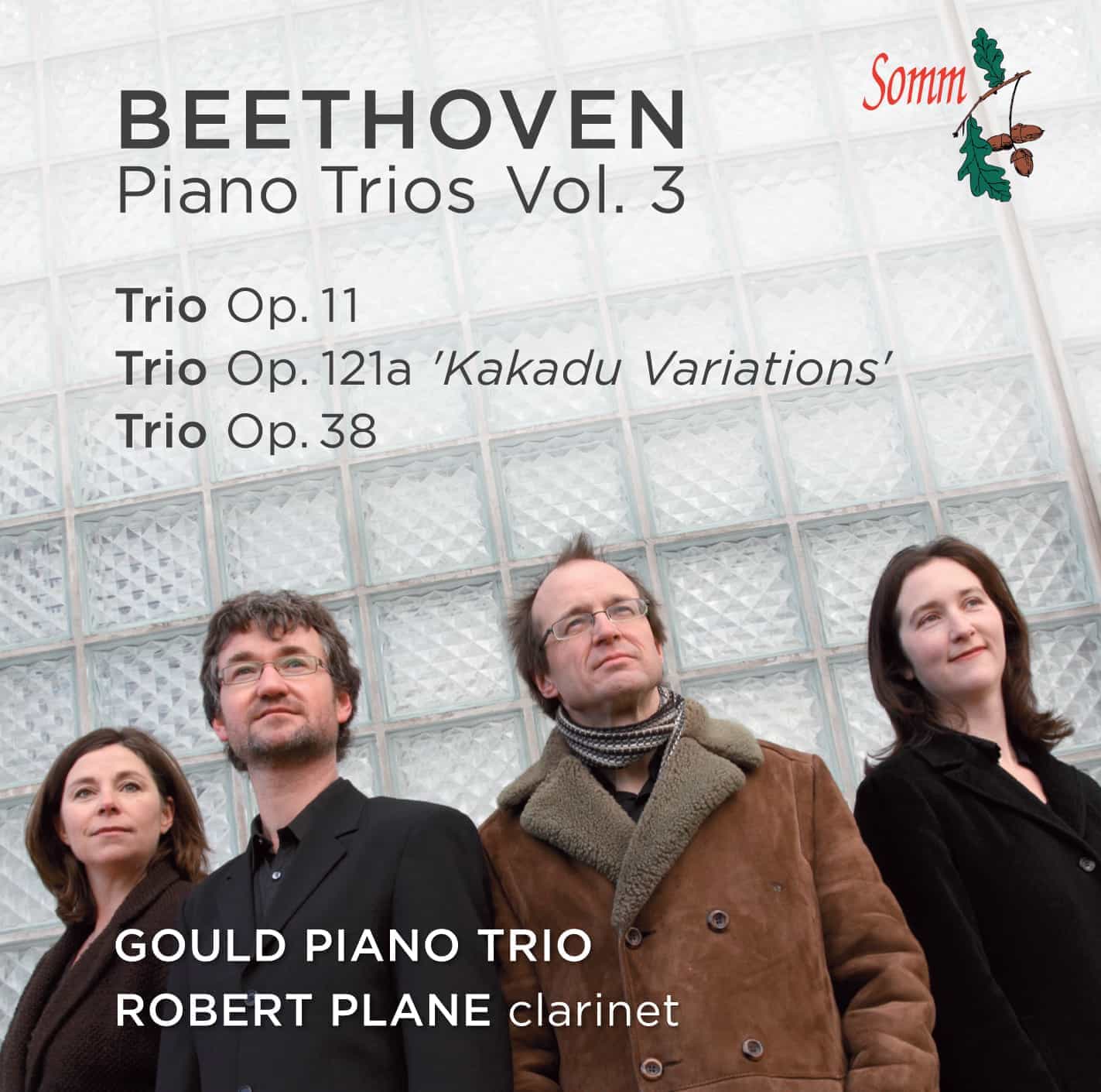Trio Op. 11
Trio Op. 121a ‘Kakadu Variations’
Trio Op. 38
Gould Piano Trio
Robert Plane Clarinet
This is the third of four fabulous concerts given by the Gould Piano Trio at St. George’s, Brandon Hill, Bristol and captured live on disc by SOMM. The concert recorded on this third Volume took place in February 2012 as part of a simultaneous live broadcast by BBC Radio Three for later transmission. The Gould Piano Trio are joined here by the popular clarinettist Robert Plane (former principal clarinettist of the BBC National Orchestra of Wales and the CBSO) who features in two of the three works on the CD.
“Cantabile playing – beautiful singing tone – is fundamental to the Goulds’ style, and this was most apparent in the slow movement, its variations unfolding gently and majestically. Hats off to violinist Lucy Gould, cellist Alice Neary and pianist Benjamin Frith but the honour was threefold. This was compelling playing, with every note voiced to carry its true functional and emotional weight, as the live recording will surely confirm”. The Guardian (Volume I, SOMMCD 0114)
“The Gould Piano Trio, established players in this repertoire, prove masterly: nimble, agile and intense.” The Observer (Volume II, SOMMCD 0120)
Beethoven composed the Op. 11 Trio in B flat major in 1798 and scored it for piano, clarinet (or violin) and cello. It opens with a graceful Allegro con brio followed by a beautiful, lyrical Adagio 2nd movement. The Allegretto third movement opens with a delightful theme leading to a witty set of nine variations.
Beethoven originally composed the set of Variations on ‘Ich bin der Schneider Kakadu’ (‘I am the tailor cockatoo’) round about 1795, the year following the appearance of Wenzel Müller’s 1794 comic Singspiel Die Schwestern von Prag (‘the Sisters from Prague’), in which this soon-to-be-popular song may be found. Müller’s opera was revived in 1814 and its success prompted Beethoven to revise these ten variations worthy of the, by then, great composer. Each of the 10 variations seems to become more elaborate than its predecessor, and this brilliant work ends with a quasi-fugue as the music hurries to its delightful end.
The concluding work is a rarity: the Piano Trio version of the Septet Op. 20. The Septet was first performed in 1800 and became one of Beethoven’s most successful and popular works. It circulated in many editions and arrangements for different forces. In 1803 Beethoven himself arranged it as a Trio for clarinet (or violin), cello and piano, and this version was published as his Op. 38 in 1805. The music falls into the tradition of the instrumental classical serenade in that there are no fewer than six movements.
Gould Piano Trio
Since winning first prize at both the Premio Vittorio Gui in Florence and the inaugural Melbourne Chamber Music Competition, while being promoted n Europe and the US as British ‘Rising Stars’, the Gould Piano Trio is now considered as one of the finest of its kind performing today. The Independent described its members as ‘master musicians’, and their widely diverse repertoire and ever-expanding discography display a strong stylistic conviction appreciated by audiences and critics alike. Concerts at major venues such as the Wigmore and Carnegie Halls and the Concertgebouw in Amsterdam and tours of North and South America, Europe and the Far East, as well as highly regarded educational projects, have introduced them to a wide and varied public. Having established their own annual festival with Robert Plane in the Northumbrian town of Corbridge, they enjoy exploring contrasting chamber music genres with their musical peers. Their first-hand experience of work with contemporary composers has led to the commissioning of many new works, the most recent being a piano trio from James MacMillan for premiere in 2014.
Robert Plane won the Royal Over-Seas League Music Competition in London in 1992 and has since enjoyed an international solo and chamber career. He has made concerto appearances in the USA, China, Germany, Spain, Switzerland, Malta and Ireland with the Virginia Symphony, Zurich Chamber Orchestra, Dortmund Philharmonic, RTE National Symphony Orchestra, Ulster Orchestra, Bournemouth Symphony and on tour with the City of London Sinfonia and the BBC National Orchestra of Wales. He made his BBC Proms concerto debut in 2011 in Simon Holt’s Double concerto ‘Centauromachy’.
Robert has collaborated with the Gould Piano Trio for over 20 years, in concert and on disc. CDs of music by Brahms, Bax, York Bowen, Stanford and Cyril Scott have been highly acclaimed, BBC Music Magazine describing their release of Messiaen’s Quartet for the End of Time as the ‘best modern account’ of this monumental work. Robert regularly performs with leading string quartets (Maggini, Auer, Brodsky, Dante, Mandelring, Vellinger, Carducci, Cavaleri, Tippett) and with pianist Sophia Rahman.
Robert has held the principal clarinet positions of Northern Sinfonia, the City of Birmingham Symphony Orchestra and the BBC National Orchestra of Wales.
On This Recording
- Trio: I. Allegro con brio
- Trio: II. Adagio
- Trio: III. Theme and Variations: Allegretto
- Variations on Wenzel Müller's Ich bin der Schneider Kakadu: Variations in G Major on Wenzel Muller's Ich bin der Schneider Kakadu, Op. 121a
- Clarinet Trio: I. Adagio - Allegro con brio
- Clarinet Trio: II. Adagio cantabile
- Clarinet Trio: III. Tempo de menuetto
- Clarinet Trio: IV. Tema con variazioni: Andante
- Clarinet Trio: V. Scherzo: Allegro molto e vivace
- Clarinet Trio: VI. Andante con moto - Presto





